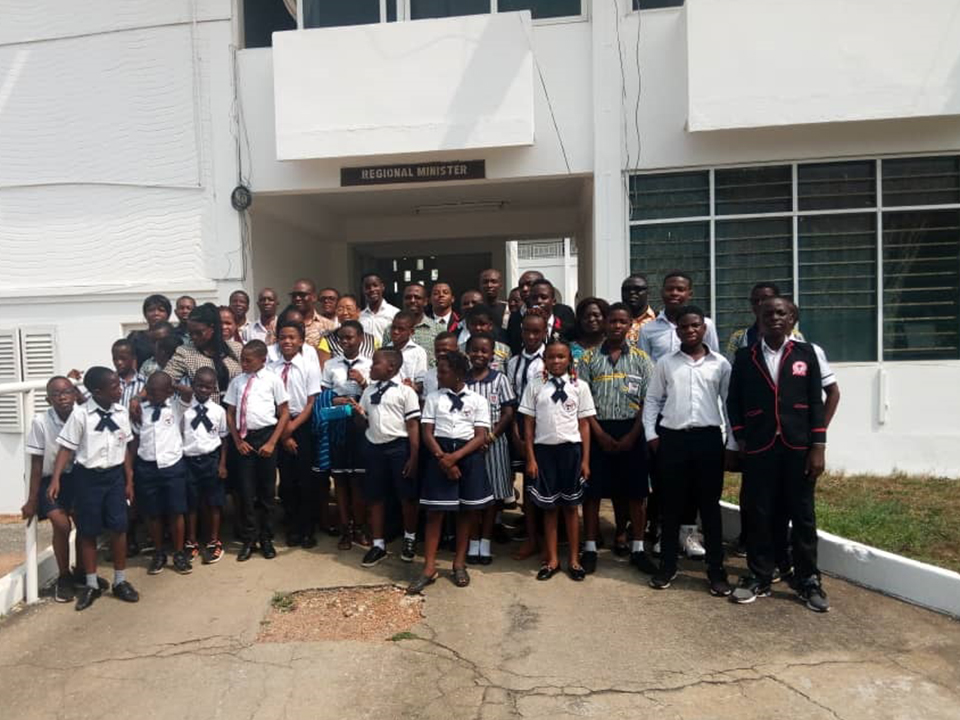The Third Research Awards and Grants (RAG) Ceremony has been held under the auspices of the Directorate of Research, Innovation and Consultancy (DRIC) at the School of Medical Sciences.
The annual award scheme is aimed at motivating and honouring faculty members who distinguished themselves through impact-oriented research as well as those who have shown potential in the same regard.
Prof. Florian Carl from the Department of Music received the Best Evolved Researcher Award whilst Dr. Adeladza Kofi Amegah of the Department of Clinical Nutrition and Dietetics was awarded the Best Evolving Researcher. They had opportunity to share their research output and experiences with policy
In all 24 faculty members were awarded certificates and cash prizes at the ceremony.
Present at the ceremony were policy makers, academics, industrialists, representatives of some tertiary institutions, University Community and the general public. Here is a list of faculty members and their research projects.
|
Name |
Title of Research Projects |
Focus |
|
DR JOHN ABRAHAM |
Towards Biological Control of fall Arymyworm: An Investigation of the Constitutive and Spodoptera Frugiperda- Induced Volatiles of Maize Varieties in Ghana. |
Biological |
|
Dr. Moses Teye |
Carcass Characteristics and Fatty Acid Profile of Rabbits Fed Diets Formulated with Palm Kernel Oil Residue |
Agriculture |
|
Dr. Isaac Okyere |
Reproduction Potential of the lampeye killifish A. spilauchen in Captivity and its Biology and Health Implications for Mosquito Biocontrol |
Biology & Health |
|
Dr. Issahaku Adam |
Attitude, and Attitudinal Functions of Hotel Frontline Employees towards Guests with Disability |
Hospitality Management |
|
Dr. Daniel Yaw Fiaveh |
Masculinity, Use of Herbal Alcoholic Bitters and Compulsory Heterosexuality in West Africa: Narratives from Urban Ghana |
Sociology |
|
Dr. Francis Tanam Djankpa |
Assessment of Starch as a Substitute for Agarose in DNA Gel Electrophoresis |
Physiology and Health |
|
Dr. Kingsley Kwadwo Asare Pereko |
Effects of Solanum torvum Consumption on the Haemoglobin Levels of Pregnant Women |
Health and Nutrition |
|
Rev. Emmanuel Frimpong |
Physical Activity Levels and Metabolic Health of Patients with Osteoarthritis |
Health |
|
Dr. Michael Boakye-Yiadom |
Documenting Exemplary Educational Leadership Practices in Ghanaian Higher Education (The DEELP Project) |
Education |
|
Prof. Ernes Ekow Abano |
Beta-Carotene Fortified Gari: Effect of Processing Variables on Nutritional and Sensory Quality |
Agricultural Engineering |
|
Dr. Michael Osei Adu |
Screening for Root System and Rhizosheath Traits of Cowpea to Boost Protein Production within Phosphorus-Limited Subsistence Farming Systems |
Agriculture |
|
Dr. Samuel Sanko Sackey |
NAA as a Tool to Determine Concentration of Some Heavy Metals in Salt Mined from Benya Lagoon, Ghana, Using GHARR-1 |
Environmental Physics |
|
Dr James Atta Peprah |
Mobile Money Ecosystem and Access to Financial Services among Rural Farmers in Some Selected Districts in Ghana |
Economics |
|
Dr. Emmanuel Ekow Asmah |
Economic Costs of Raising Children and Cost Implications for Widowhood: A Case Study of Households in the Cape Coast Metropolis in Ghana |
Economics and Sociology |
|
Dr. Owusu Boampong |
Exploring Psychosocial and Labour Conditions of Womb Renters and Gamete Donors as Reproductive Workers in Ghana |
Health |
|
Dr. Mrs. Phyllis Elsie Owusu Agyei |
An investigation into the Possible Hypolipideamic Activity of Celecoxib, a Selective Cyclooxygenase II Inhibitor, in a Murine Model |
Pharmacology and Health |
|
Dr. Nancy Innocentia Ebu Enyan |
Education Intervention Study on Cervical Cancer and Screening for Women in the K. E. E. A District of the Central Region of Ghana |
Health |
|
Dr. Stephen Ocansey |
Normative Database for Retinal Nerve Fibre Layer Thickness and Optic Nerve Head Parameters in the Ghanaian Population for Glaucoma Diagnosis |
Optometry and Health |
|
Rev. Fr. Dr. Anthony Kwabena Nkyi |
Correlates of Depression, Purpose in Life, Loneliness, General Health and Anxiety among Patients in Ankaful Psychiatric Hospital |
Health |
|
Dr. Benjamin Anderson |
Authenticating Honey from the Central Region of Ghana Using Optical Spectroscopy Techniques |
Food Safety & Physics |
|
Dr. Mrs. Dorcas Obiri Yeboah |
Seroconversion of Hepatitis B Vaccine among Healthcare Workers in the Cape Coast Metropolis, Central Region, Ghana |
Health |
|
Prof. Eric Nyarko-Sampson |
Career Orientations and Person-environment Fit as Predictors of Turnover Intentions of Secondary School Teachers in Ghana |
Education |
|
Dr. Andreas A. Kudom |
Domestic Pesticide Use: Implications for Health, Environment and Biodiversity |
Health and Environment |
|
Prof. Florian Carl |
Ghana Music Documentation Project: Mapping Cultural Diversity, Promoting Sustainable Musical Futures |
Arts and Development |

